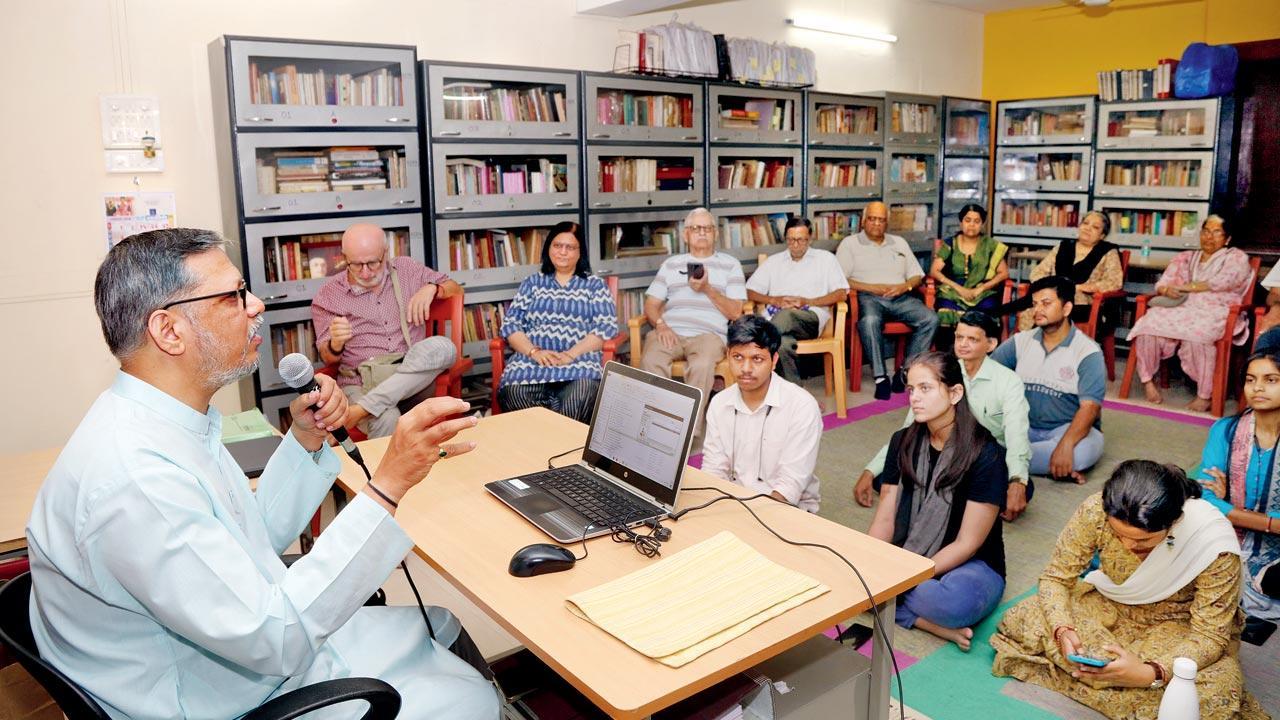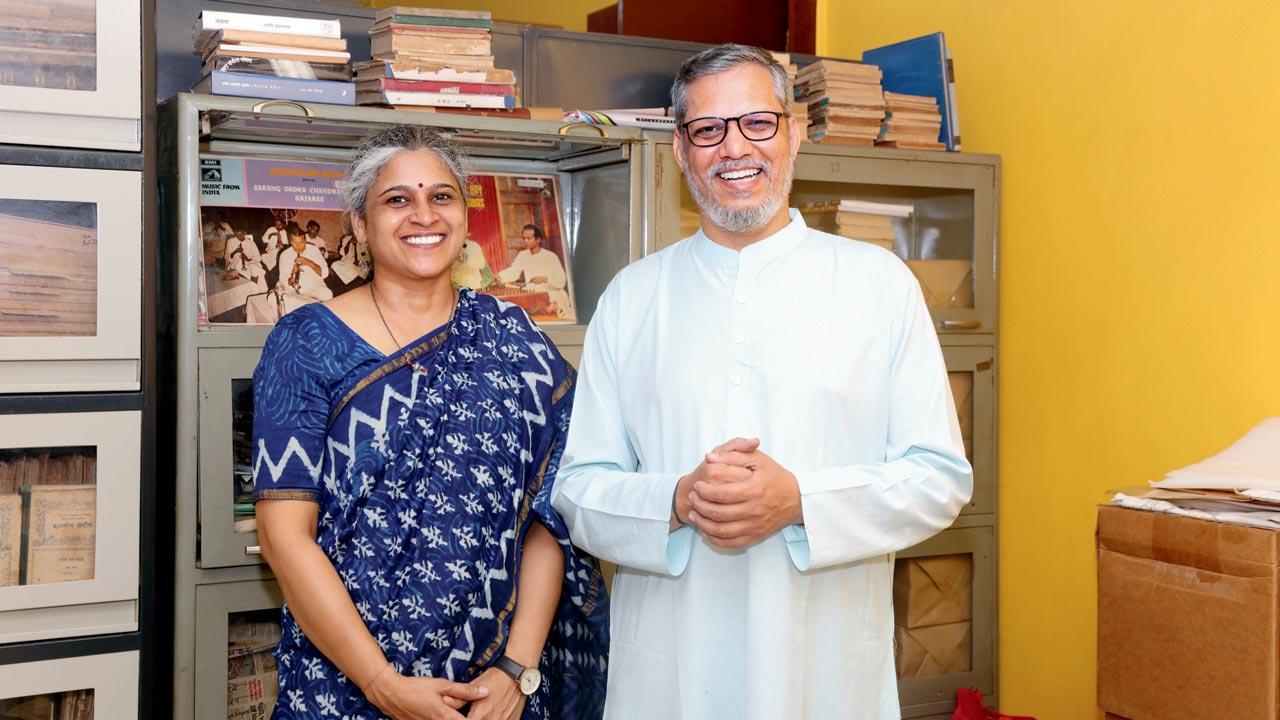How an archival centre in Pune, created in memory of late ethnomusicologist Dr Ashok Damodar Ranade, is drawing practitioners of music and beyond

Dr Keshavchaitanya Kunte, a former student of Dr Ashok Damodar Ranade, has been planning weekly and monthly activities at the archives to draw newer audiences
Stepping into the Dr Ashok Damodar Ranade Archives (ADRA) at the Jyotsna Bhole Sabhagruha in Pune, you feel as if the boundaries separating the arts have collapsed. This is what the late Dr Ranade believed in as well.
ADVERTISEMENT
The public archive, built in memory of the eminent Mumbai-based ethnomusicologist, is the go-to address in Pune, if you are looking for a particular composition or reference material, or simply to soak in the rich inter-connected world of arts, culture, geography, and languages.
ADRA is the brainchild of Dr Keshavchaitanya Kunte, a former student of Dr Ranade. “His death in 2011 was untimely,” he says, “After he passed on, tabla player Aneesh Pradhan, a few of his close associates and I visited his wife and suggested that we donate his personal collection to performing arts institutes or universities.” His wife, Hemangini Ranade, he remembers, wanted the material to be more accessible. “We then thought of creating a public archive that could benefit researchers, artistes, students and laymen.”
 Keshavchaitanya with his wife Shruti, who is responsible for digitising archival material and creating metadata. Pics/M Fahim
Keshavchaitanya with his wife Shruti, who is responsible for digitising archival material and creating metadata. Pics/M Fahim
In March 2013, the Kuntes—Keshavchaitanya and his wife Shruti—transported Dr Ranade’s collection from Mumbai to Pune. “As I have been associated with the Maharashtra Cultural Centre (MCC) for nearly three decades, I put forth a proposal before its members, to set up the archives in the premises of Jyotsna Bhole Sabhagruha.” ADRA was inaugurated a year later by noted vocalist Shubha Mudgal.
Pramod Kale, a member of the MCC says, “The centre was founded with the idea to promote cultural activities; nothing could be better than being associated with Dr Ranade’s work.”
The archives are home to valuable and rare material. The print section has a collection of approximately 3,500 works which include books, research papers, journals, handwritten notes and photographs. The audio segment comprises gramophone records, audio tapes and live concert cassettes.
At present, the audio collection has around 3,000 hours of recorded music. “We were initially guided by Pramod Kale and Varsha Joglekar [she worked under Dr Ranade at the National Centre for Performing Arts]. Currently, my work involves preserving material that is over a century-old, digitising it and creating metadata,” says Shruti.
Other stalwarts from Indian classical music have also reposed their faith in the Kuntes and ADRA by handing over their collections. “The personal collection of Sardar Abasahaeb Muzumdar, a music scholar from Pune, was donated by his granddaughter-in-law. The Hindustani classical vocalist late Malinitai Rajurkar also handed over her material to the archives. Recently, Dr Balwant Dixit, who resides in the US, and has spent nearly five decades of his life researching Indian classical music, shared his audio and print material with us,” adds Keshavchaitanya.
While academicians have made use of the archives, the struggle was to get artistes to take an interest in it. “To make this possible, we decided to select a theme and organise a performance based on the archive. It is staged each year around October 31—ADRA’s foundation day. The idea was to make use of the archival material and create something entirely new out of it,” adds Keshavchaitanya, who teaches music at the Lalit Kala Kendra Gurukul, Savitribai Phule Pune University.
Maharashtratil Stree Geet, a programme that was organised last year and focused on songs prevalent nearly a century ago, was a result of this effort. Madhavi Chakradeo, who works at ADRA and performed at this event, shares: “Krishnarao Mule, who was a connoisseur of music, had made notations of Stree Geet, which we had in the archives. I composed songs based on the notations and sang them. It was a challenging yet enriching experience.”
This year, on November 4, Kale has curated a programme to highlight the works of DG Godse. “Godse was a multi-faceted personality—he was a critique of the arts, an art director, painter, playwright and a pakhawaj player. “We have planned to showcase his writings, paintings and also conduct dramatised readings of his works.”
Apart from the concerts, weekly or monthly activities are planned to reach out to newer audiences. “Recently, Iranian musician Sasan Bazgir conducted a live demonstration on Persian music,” says Keshavchaitanya, adding, “At these sessions, the attendees come up with interesting observations. A change in perspective is seen. I think that’s a good sign.”
Prachi Gondachavar, a regular attendee, says, “I enjoy the curated guiding sessions. They reveal how huge and transcendent the world of music is.”
 Subscribe today by clicking the link and stay updated with the latest news!" Click here!
Subscribe today by clicking the link and stay updated with the latest news!" Click here!







